Unit 2 Travelling Grammar 课件
文档属性
| 名称 | Unit 2 Travelling Grammar 课件 |  | |
| 格式 | zip | ||
| 文件大小 | 2.9MB | ||
| 资源类型 | 试卷 | ||
| 版本资源 | 牛津译林版 | ||
| 科目 | 英语 | ||
| 更新时间 | 2023-02-16 22:40:15 | ||
图片预览

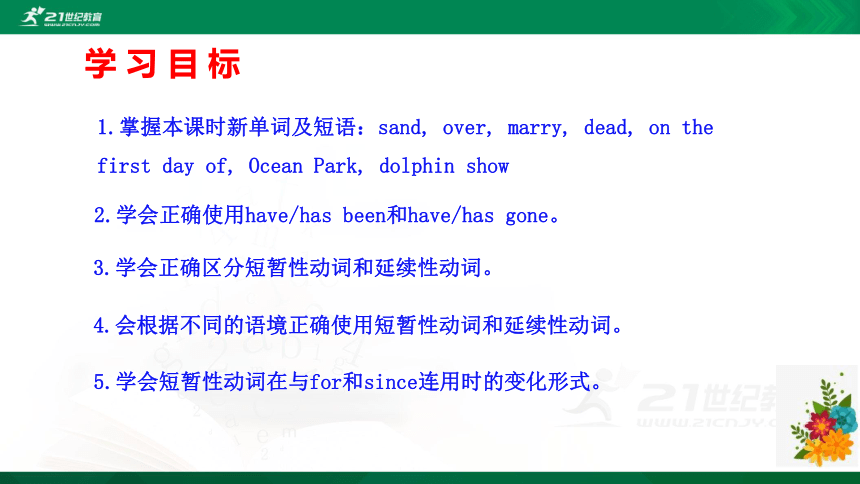
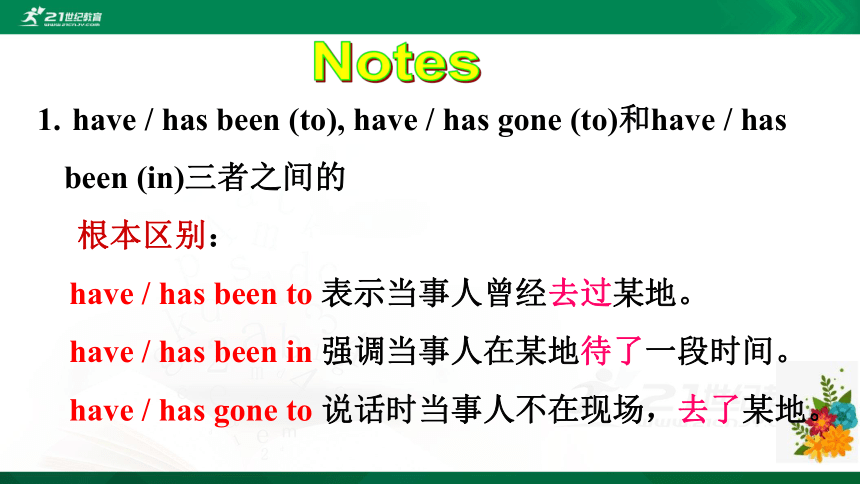

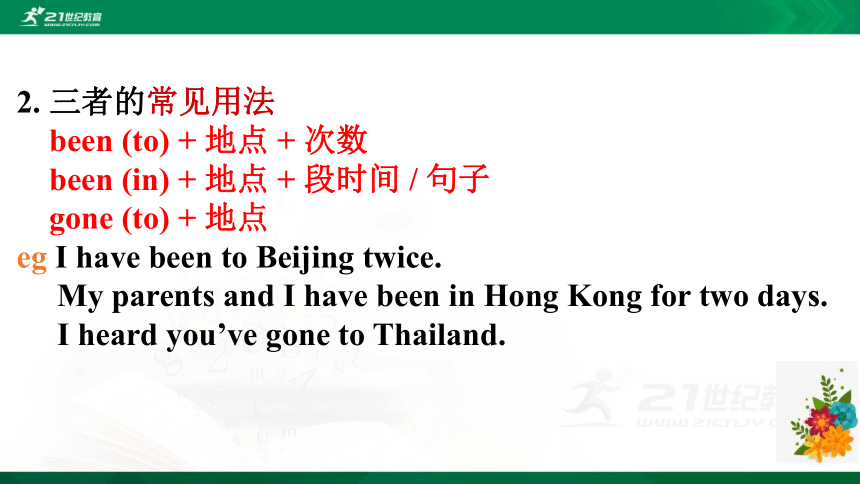
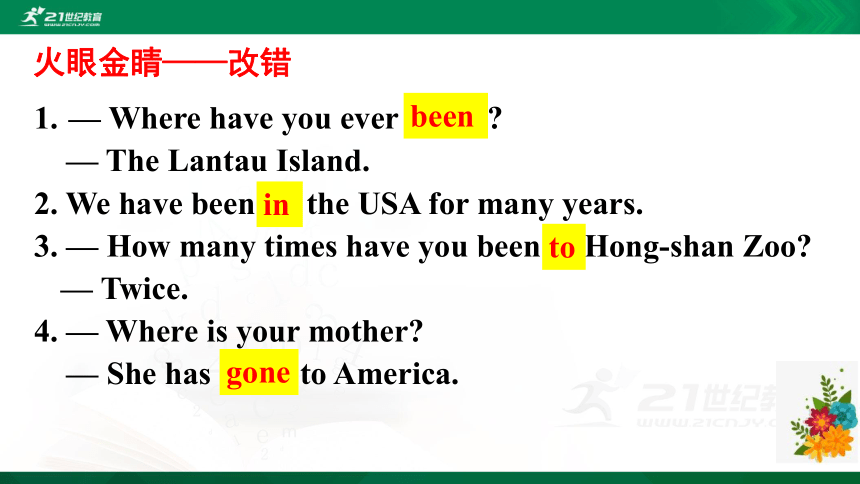
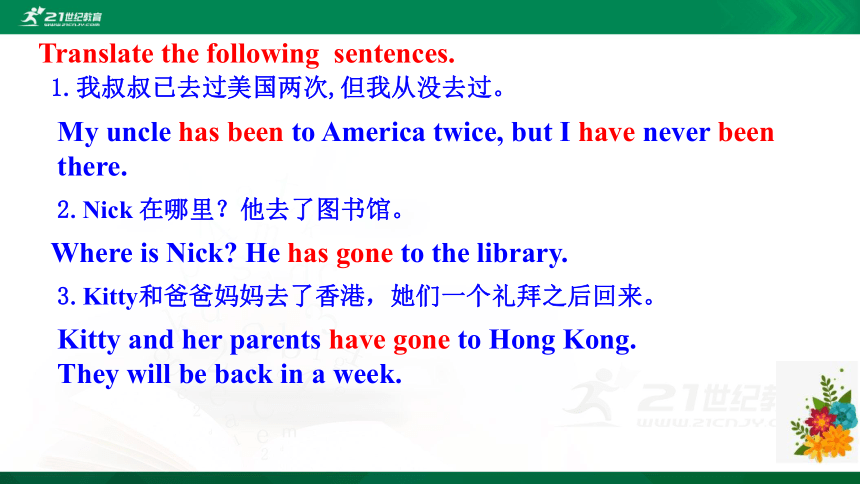
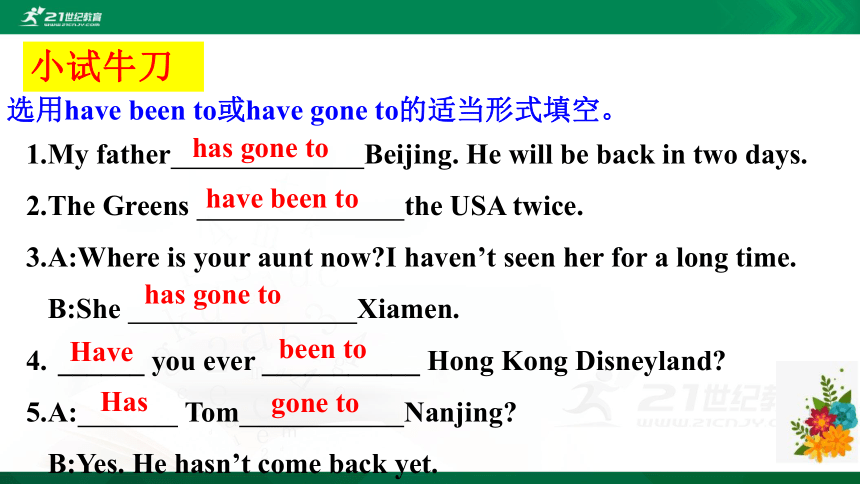
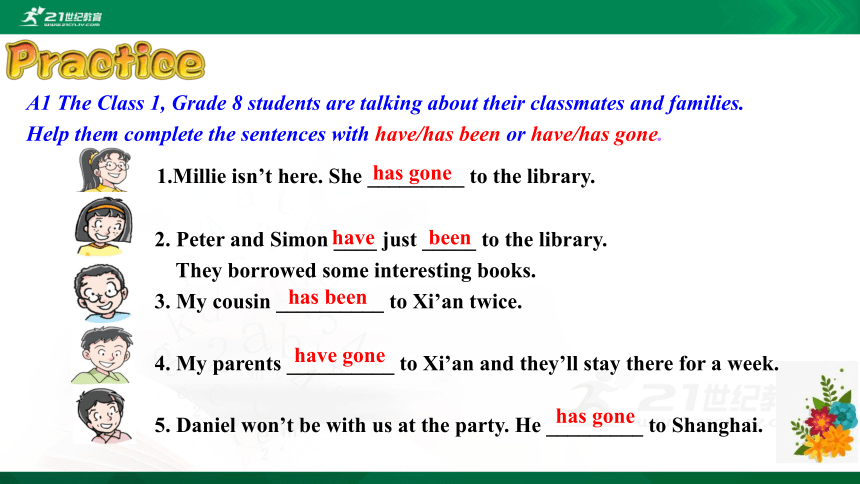
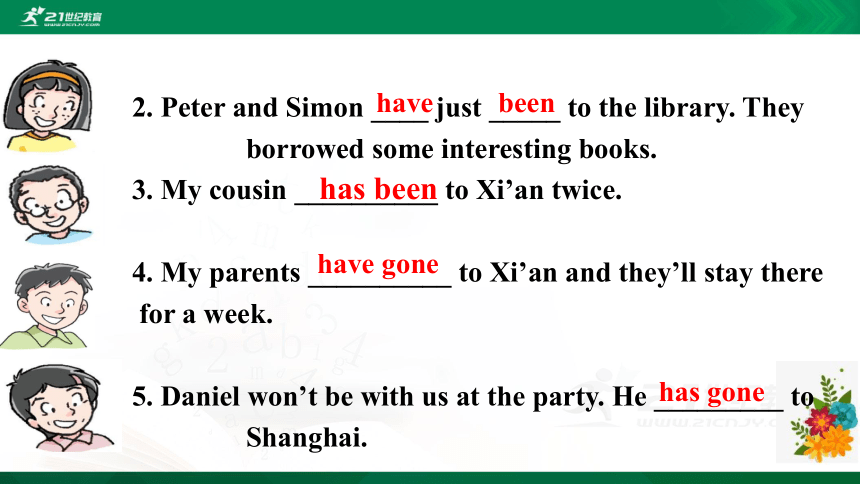
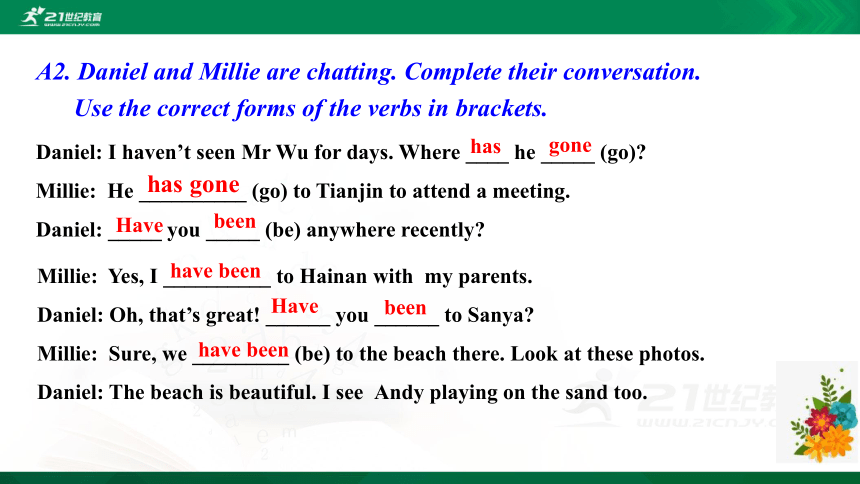
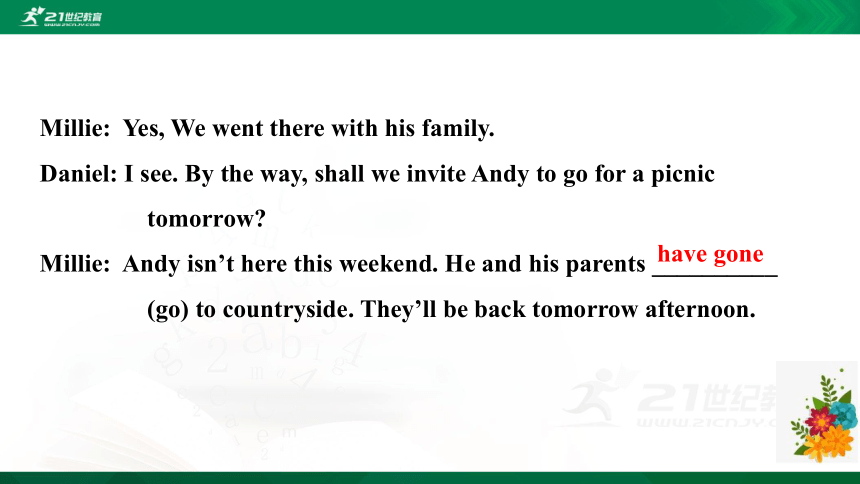
文档简介
(共35张PPT)
译林版·八年级下册
Unit 2 Travelling
Grammar
学 习 目 标
1.掌握本课时新单词及短语:sand, over, marry, dead, on the first day of, Ocean Park, dolphin show
5.学会短暂性动词在与for和since连用时的变化形式。
2.学会正确使用have/has been和have/has gone。
4.会根据不同的语境正确使用短暂性动词和延续性动词。
3.学会正确区分短暂性动词和延续性动词。
have / has been (to), have / has gone (to)和have / has been (in)三者之间的
根本区别:
have / has been to 表示当事人曾经去过某地。
have / has been in 强调当事人在某地待了一段时间。
have / has gone to 说话时当事人不在现场,去了某地。
Notes
past
present
future
past
present
future
have/has been to …
have/has gone to …
went there
went there
be back
haven’t returned
Differences
2. 三者的常见用法
been (to) + 地点 + 次数
been (in) + 地点 + 段时间 / 句子
gone (to) + 地点
eg I have been to Beijing twice.
My parents and I have been in Hong Kong for two days.
I heard you’ve gone to Thailand.
火眼金睛——改错
— Where have you ever gone
— The Lantau Island.
2. We have been to the USA for many years.
3. — How many times have you been in Hong-shan Zoo — Twice.
4. — Where is your mother
— She has been to America.
been
in
to
gone
Translate the following sentences.
1.我叔叔已去过美国两次,但我从没去过。
My uncle has been to America twice, but I have never been there.
2.Nick 在哪里?他去了图书馆。
Where is Nick He has gone to the library.
3.Kitty和爸爸妈妈去了香港,她们一个礼拜之后回来。
Kitty and her parents have gone to Hong Kong.
They will be back in a week.
1.My father Beijing. He will be back in two days.
2.The Greens the USA twice.
3.A:Where is your aunt now I haven’t seen her for a long time.
B:She Xiamen.
______ you ever ___________ Hong Kong Disneyland
5.A: Tom Nanjing
B:Yes. He hasn’t come back yet.
小试牛刀
选用have been to或have gone to的适当形式填空。
has gone to
have been to
has gone to
Have
been to
Has
gone to
1.Millie isn’t here. She _________ to the library.
A1 The Class 1, Grade 8 students are talking about their classmates and families.
Help them complete the sentences with have/has been or have/has gone.
has gone
2. Peter and Simon ____ just _____ to the library.
They borrowed some interesting books.
3. My cousin __________ to Xi’an twice.
4. My parents __________ to Xi’an and they’ll stay there for a week.
5. Daniel won’t be with us at the party. He _________ to Shanghai.
have been
has been
have gone
has gone
2. Peter and Simon ____ just _____ to the library. They borrowed some interesting books.
3. My cousin __________ to Xi’an twice.
4. My parents __________ to Xi’an and they’ll stay there
for a week.
5. Daniel won’t be with us at the party. He _________ to Shanghai.
have been
has been
have gone
has gone
Daniel: I haven’t seen Mr Wu for days. Where ____ he _____ (go)
Millie: He __________ (go) to Tianjin to attend a meeting.
Daniel: _____ you _____ (be) anywhere recently
A2. Daniel and Millie are plete their conversation.
Use the correct forms of the verbs in brackets.
has
gone
has gone
Have
been
Millie: Yes, I __________ to Hainan with my parents.
Daniel: Oh, that’s great! ______ you ______ to Sanya
Millie: Sure, we _________ (be) to the beach there. Look at these photos.
Daniel: The beach is beautiful. I see Andy playing on the sand too.
have been
Have
been
have been
Millie: Yes, We went there with his family.
Daniel: I see. By the way, shall we invite Andy to go for a picnic tomorrow
Millie: Andy isn’t here this weekend. He and his parents __________ (go) to countryside. They’ll be back tomorrow afternoon.
have gone
Verbs with for and since
We use for when we talk about a period of time, and we use since when we talk about a time point in the past.
e.g. Mr Dong has lived here for many years.
Mr Dong has lived her since he was born.
Some verbs, such as come, go, buy and leave, can be used in the present perfect sense, but they cannot be used with for or since in positive statements.
Verbs with for and since
I lived here five years ago .(同义句)
I have lived here since five years ago .
I have lived here for five years .
此句中的动词live 是可以延续的, 可以和since+点时间
以及for + 一段时间连用。
如果动词是非延续性的,则不可以和since以及for连用
常见结构如下:
for + 表示一段时间的状语
一段时间+ ago
since + 表示过去的某一时间点
从句
Fill in the blanks wih“for” and“since”
______ two years 2) _______ two years ago
3) _______ last month 4) ______ 1999
5) _______ yesterday 6) _______ 4 o’clock
7) ______ 4 hours 8) _______ an hour ago
9) _______ we were children 10) _____ lunchtime
3. He has studied Japanese _______three years.
5. It has been ten years _____ she left the city.
since
for
for
since
since
since
since
for
since
since
since
since
He has left Beijing for a week.
He has not left Beijing yet.
He has been away from Beijing for a week.
He has bought a car since 2007.
√
√
×
×
He has not bought any new car since 2007.
√
He has had a car since 2007.
√
选用 for和 since填空:
1.We haven’t seen each other ______ a long time.
2.His father has been in the Party ______ 10 years ago.
3.The film has been on ______ 20 minutes.
4.Mr Green has worked here ______ he came to China.
5.His grandparents have been dead _____ several years.
for
since
for
since
for
下一页
for后面应该接“段时间”;
since后面应该接“点时间”或者“句子”
Conclusion
“一般过去时”
他已经离开了。
He has left.
他已经离开三天了。
He for 3 days.
since 3 days ago.
has
leave
瞬间动词
→
be away
延续动词
been away
电影已经开始了。
The film has begun.
电影已经开始30分钟了。
He for 30 minutes.
since 30 minutes ago.
has
begin
瞬间动词
→
be on
延续动词
been on
summary
在for或since引导的表示一段时间状语的现在完成时的肯定句中,我们要用延续性动词,而不能用短暂性动词。但短暂性动词可以用于它们的否定句中也可以以另一种形式表示延续性就可以与for或since连用。短暂性动词可以和过去时间连用,如(yesterday、two years ago…
用for, since, ago填空
Sally has been away from London ________ last Saturday.
Our school has changed a lot ________ the new building was built.
Tommy has had this motorcycle ________ three years.
I have been in Nanjing ________ eight years.
My parents has been married since twenty years ________.
My cousin joined the army three months ______ .
since
since
for
for
ago
ago
瞬间动词→延续性动词的转换(与since/for 连用)
arrive → be here
begin/start → be on
die →be dead
buy → have
get up →be up
finish →be over
put on →wear/be on
fall ill/sick/asleep →be ill/sick/asleep
come back → be back
leave → be away (from)
join →be in/ be a member of
open → be open
close → be closed
borrow → keep
catch a cold →have a cold
get to know →know
begin to study →study
get married → be married
如buy和borrow是非延续性动词,我们在使用时要注意。
我们可以说:I bought a present last week .
但我们不可以说:
I have bought a present for one week .
I have bought a present since one week ago .
为了和for以及since连用,在使用完成时我们需把非延续性动词转换成延续性。
buy
have / has had
I lived here five years ago .(同义句)
I have lived here since five years ago .
I have lived here for five years .
此句中的动词live 是可以延续的, 可以和since+点时间以及for + 一段时间连用。
如果动词是非延续性的,则不可以和since以及for连用
(1) I have seen many interesting films since 2012. ( )
(2) Tom’s dog has died for two years. ( )
(3) They have been in Guilin for a week. ( )
(4) Kitty has left Beijing since last Monday. ( )
(5) Daniel has bought his gloves for a year. ( )
True or False
has been dead
has been away from
has had
F
T
T
F
F
Kitty is telling Millie about her holiday in Hong Kong on the plete what she says with the correct forms of the verbs in brackets.
More about Kitty's trip
My parents and I ⑴________ (arrive) in Hong Kong on the first day of the winter holiday. We (2)_________ (be) here for three days.
arrived
have been
I (3)___________(borrow) a book about Hong Kong a week ago. It’s very useful. I (4) __________(keep) it with me for a few days. It helps me learn more about Hong Kong.
Now it’s noon and we’re in Ocean Park. The first dolphin show (5)_______ (begin) at 11:30 a.m. It (6)_________ (be) on for about half an hour. The show is really exciting.
borrowed
have kept
began
has been
写出它们的同义句
(1).I bought this computer six months ago.
I_____________ this computer for six months.
(2).She borrowed the magazine yesterday.
She_____________ the magazine since yesterday.
(3).Uncle Sam arrived in Nanjing three years ago.
Uncle Sam _____________ Nanjing for three years.
(4).Judy and Mark got married last month.
Judy and Mark___________________ since last month.
(5).Mr Wang left his hometown when he was seven.
Mr. Wang ______________his hometown since he was seven.
(6).The meeting began ten minutes ago.
The meeting _____________ for ten minutes.
have had
has kept
has been in
have been married
has been away from
has been on
Exercises
同义句转换
The class finished ten minutes ago.
The class _____________ for ten minutes.
2. I bought the MP3 last week.
I __________ the MP3 for a week.
3. The exhibition has been on for three days.
The exhibition ____________ three days ago.
4. My parents got married 25 years ago.
My parents ________________ since 25 years ago.
has been on
have had
began
have been married
四、完成句子
1. “你去哪儿了?” “我去科学博物馆了。”
—Where______ ______ ______
—I ______ ______ _______ the Science Museum.
2. “你去过了几次上海迪斯尼乐园。 ” “从来没有。 ”
— _______ _______ ______ _______ you been ______ Shanghai Disneyland
— ________.
3.这本杂志我已经借了两周了。
I ______ ______ ______ _________ ______ two weeks.
4.约翰已经回英国了。他回去已经有两天了。
John _____ _______ _______ to England. He’s _______ ______ _____two days.
5.英语课已经开始十分钟了,快点!
Hurry up! The English class ______ _______ _____ _______
ten minutes ago.
have you been
have been to
How many times have to
have kept the magazine for
has gone back been back for
has been on since
Never
Homework:
1. Go over Grammar A & B.
2. Finish the exercises in the workbook.
3. Prepare Integrated skills.
谢谢
21世纪教育网(www.21cnjy.com)
中小学教育资源网站
兼职招聘:
https://www.21cnjy.com/recruitment/home/admin
译林版·八年级下册
Unit 2 Travelling
Grammar
学 习 目 标
1.掌握本课时新单词及短语:sand, over, marry, dead, on the first day of, Ocean Park, dolphin show
5.学会短暂性动词在与for和since连用时的变化形式。
2.学会正确使用have/has been和have/has gone。
4.会根据不同的语境正确使用短暂性动词和延续性动词。
3.学会正确区分短暂性动词和延续性动词。
have / has been (to), have / has gone (to)和have / has been (in)三者之间的
根本区别:
have / has been to 表示当事人曾经去过某地。
have / has been in 强调当事人在某地待了一段时间。
have / has gone to 说话时当事人不在现场,去了某地。
Notes
past
present
future
past
present
future
have/has been to …
have/has gone to …
went there
went there
be back
haven’t returned
Differences
2. 三者的常见用法
been (to) + 地点 + 次数
been (in) + 地点 + 段时间 / 句子
gone (to) + 地点
eg I have been to Beijing twice.
My parents and I have been in Hong Kong for two days.
I heard you’ve gone to Thailand.
火眼金睛——改错
— Where have you ever gone
— The Lantau Island.
2. We have been to the USA for many years.
3. — How many times have you been in Hong-shan Zoo — Twice.
4. — Where is your mother
— She has been to America.
been
in
to
gone
Translate the following sentences.
1.我叔叔已去过美国两次,但我从没去过。
My uncle has been to America twice, but I have never been there.
2.Nick 在哪里?他去了图书馆。
Where is Nick He has gone to the library.
3.Kitty和爸爸妈妈去了香港,她们一个礼拜之后回来。
Kitty and her parents have gone to Hong Kong.
They will be back in a week.
1.My father Beijing. He will be back in two days.
2.The Greens the USA twice.
3.A:Where is your aunt now I haven’t seen her for a long time.
B:She Xiamen.
______ you ever ___________ Hong Kong Disneyland
5.A: Tom Nanjing
B:Yes. He hasn’t come back yet.
小试牛刀
选用have been to或have gone to的适当形式填空。
has gone to
have been to
has gone to
Have
been to
Has
gone to
1.Millie isn’t here. She _________ to the library.
A1 The Class 1, Grade 8 students are talking about their classmates and families.
Help them complete the sentences with have/has been or have/has gone.
has gone
2. Peter and Simon ____ just _____ to the library.
They borrowed some interesting books.
3. My cousin __________ to Xi’an twice.
4. My parents __________ to Xi’an and they’ll stay there for a week.
5. Daniel won’t be with us at the party. He _________ to Shanghai.
have been
has been
have gone
has gone
2. Peter and Simon ____ just _____ to the library. They borrowed some interesting books.
3. My cousin __________ to Xi’an twice.
4. My parents __________ to Xi’an and they’ll stay there
for a week.
5. Daniel won’t be with us at the party. He _________ to Shanghai.
have been
has been
have gone
has gone
Daniel: I haven’t seen Mr Wu for days. Where ____ he _____ (go)
Millie: He __________ (go) to Tianjin to attend a meeting.
Daniel: _____ you _____ (be) anywhere recently
A2. Daniel and Millie are plete their conversation.
Use the correct forms of the verbs in brackets.
has
gone
has gone
Have
been
Millie: Yes, I __________ to Hainan with my parents.
Daniel: Oh, that’s great! ______ you ______ to Sanya
Millie: Sure, we _________ (be) to the beach there. Look at these photos.
Daniel: The beach is beautiful. I see Andy playing on the sand too.
have been
Have
been
have been
Millie: Yes, We went there with his family.
Daniel: I see. By the way, shall we invite Andy to go for a picnic tomorrow
Millie: Andy isn’t here this weekend. He and his parents __________ (go) to countryside. They’ll be back tomorrow afternoon.
have gone
Verbs with for and since
We use for when we talk about a period of time, and we use since when we talk about a time point in the past.
e.g. Mr Dong has lived here for many years.
Mr Dong has lived her since he was born.
Some verbs, such as come, go, buy and leave, can be used in the present perfect sense, but they cannot be used with for or since in positive statements.
Verbs with for and since
I lived here five years ago .(同义句)
I have lived here since five years ago .
I have lived here for five years .
此句中的动词live 是可以延续的, 可以和since+点时间
以及for + 一段时间连用。
如果动词是非延续性的,则不可以和since以及for连用
常见结构如下:
for + 表示一段时间的状语
一段时间+ ago
since + 表示过去的某一时间点
从句
Fill in the blanks wih“for” and“since”
______ two years 2) _______ two years ago
3) _______ last month 4) ______ 1999
5) _______ yesterday 6) _______ 4 o’clock
7) ______ 4 hours 8) _______ an hour ago
9) _______ we were children 10) _____ lunchtime
3. He has studied Japanese _______three years.
5. It has been ten years _____ she left the city.
since
for
for
since
since
since
since
for
since
since
since
since
He has left Beijing for a week.
He has not left Beijing yet.
He has been away from Beijing for a week.
He has bought a car since 2007.
√
√
×
×
He has not bought any new car since 2007.
√
He has had a car since 2007.
√
选用 for和 since填空:
1.We haven’t seen each other ______ a long time.
2.His father has been in the Party ______ 10 years ago.
3.The film has been on ______ 20 minutes.
4.Mr Green has worked here ______ he came to China.
5.His grandparents have been dead _____ several years.
for
since
for
since
for
下一页
for后面应该接“段时间”;
since后面应该接“点时间”或者“句子”
Conclusion
“一般过去时”
他已经离开了。
He has left.
他已经离开三天了。
He for 3 days.
since 3 days ago.
has
leave
瞬间动词
→
be away
延续动词
been away
电影已经开始了。
The film has begun.
电影已经开始30分钟了。
He for 30 minutes.
since 30 minutes ago.
has
begin
瞬间动词
→
be on
延续动词
been on
summary
在for或since引导的表示一段时间状语的现在完成时的肯定句中,我们要用延续性动词,而不能用短暂性动词。但短暂性动词可以用于它们的否定句中也可以以另一种形式表示延续性就可以与for或since连用。短暂性动词可以和过去时间连用,如(yesterday、two years ago…
用for, since, ago填空
Sally has been away from London ________ last Saturday.
Our school has changed a lot ________ the new building was built.
Tommy has had this motorcycle ________ three years.
I have been in Nanjing ________ eight years.
My parents has been married since twenty years ________.
My cousin joined the army three months ______ .
since
since
for
for
ago
ago
瞬间动词→延续性动词的转换(与since/for 连用)
arrive → be here
begin/start → be on
die →be dead
buy → have
get up →be up
finish →be over
put on →wear/be on
fall ill/sick/asleep →be ill/sick/asleep
come back → be back
leave → be away (from)
join →be in/ be a member of
open → be open
close → be closed
borrow → keep
catch a cold →have a cold
get to know →know
begin to study →study
get married → be married
如buy和borrow是非延续性动词,我们在使用时要注意。
我们可以说:I bought a present last week .
但我们不可以说:
I have bought a present for one week .
I have bought a present since one week ago .
为了和for以及since连用,在使用完成时我们需把非延续性动词转换成延续性。
buy
have / has had
I lived here five years ago .(同义句)
I have lived here since five years ago .
I have lived here for five years .
此句中的动词live 是可以延续的, 可以和since+点时间以及for + 一段时间连用。
如果动词是非延续性的,则不可以和since以及for连用
(1) I have seen many interesting films since 2012. ( )
(2) Tom’s dog has died for two years. ( )
(3) They have been in Guilin for a week. ( )
(4) Kitty has left Beijing since last Monday. ( )
(5) Daniel has bought his gloves for a year. ( )
True or False
has been dead
has been away from
has had
F
T
T
F
F
Kitty is telling Millie about her holiday in Hong Kong on the plete what she says with the correct forms of the verbs in brackets.
More about Kitty's trip
My parents and I ⑴________ (arrive) in Hong Kong on the first day of the winter holiday. We (2)_________ (be) here for three days.
arrived
have been
I (3)___________(borrow) a book about Hong Kong a week ago. It’s very useful. I (4) __________(keep) it with me for a few days. It helps me learn more about Hong Kong.
Now it’s noon and we’re in Ocean Park. The first dolphin show (5)_______ (begin) at 11:30 a.m. It (6)_________ (be) on for about half an hour. The show is really exciting.
borrowed
have kept
began
has been
写出它们的同义句
(1).I bought this computer six months ago.
I_____________ this computer for six months.
(2).She borrowed the magazine yesterday.
She_____________ the magazine since yesterday.
(3).Uncle Sam arrived in Nanjing three years ago.
Uncle Sam _____________ Nanjing for three years.
(4).Judy and Mark got married last month.
Judy and Mark___________________ since last month.
(5).Mr Wang left his hometown when he was seven.
Mr. Wang ______________his hometown since he was seven.
(6).The meeting began ten minutes ago.
The meeting _____________ for ten minutes.
have had
has kept
has been in
have been married
has been away from
has been on
Exercises
同义句转换
The class finished ten minutes ago.
The class _____________ for ten minutes.
2. I bought the MP3 last week.
I __________ the MP3 for a week.
3. The exhibition has been on for three days.
The exhibition ____________ three days ago.
4. My parents got married 25 years ago.
My parents ________________ since 25 years ago.
has been on
have had
began
have been married
四、完成句子
1. “你去哪儿了?” “我去科学博物馆了。”
—Where______ ______ ______
—I ______ ______ _______ the Science Museum.
2. “你去过了几次上海迪斯尼乐园。 ” “从来没有。 ”
— _______ _______ ______ _______ you been ______ Shanghai Disneyland
— ________.
3.这本杂志我已经借了两周了。
I ______ ______ ______ _________ ______ two weeks.
4.约翰已经回英国了。他回去已经有两天了。
John _____ _______ _______ to England. He’s _______ ______ _____two days.
5.英语课已经开始十分钟了,快点!
Hurry up! The English class ______ _______ _____ _______
ten minutes ago.
have you been
have been to
How many times have to
have kept the magazine for
has gone back been back for
has been on since
Never
Homework:
1. Go over Grammar A & B.
2. Finish the exercises in the workbook.
3. Prepare Integrated skills.
谢谢
21世纪教育网(www.21cnjy.com)
中小学教育资源网站
兼职招聘:
https://www.21cnjy.com/recruitment/home/admin
